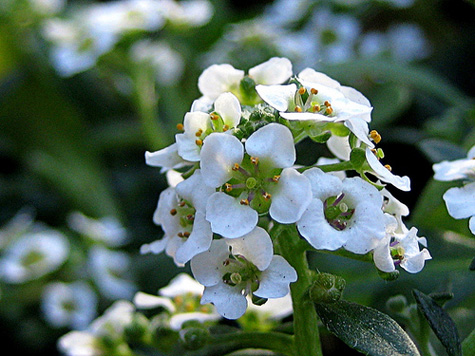Human Flower Project
Youths Choose Tech over Scent
What would you sacrifice for your cell phone? What have you already sacrificed?

Taking a break from texting, for roses and alyssum
How do you “connect” with a lilac?
We’ve just discovered a multi-national marketing study finding that a majority of 16-22 year olds would rather lose their sense of smell than give up their cell phones and other social networking devices.
The research, carried out by McCann Worldgroup, polled youths in the U.S., United Kingdom, Spain, China, India, Brazil and Mexico using some kind of random sampling, then followed up with qualitative research in 17 countries. (You’ll note that France wasn’t included.)
“While technology has often been referred to in jest as an appendage of today’s youth, over half (53%) of 16-22 year olds said they would rather give up their sense of smell than give up their technology. For this generation, technology is not an add-on. It is a tool that enables them to sense the world and make sense of the world.”
What is cantaloupe or a pine tree, or, surely, sweet alyssum? How do you “make sense” of b.o. without a sense of smell?
McCann studied 7000 16-30 year olds in April 2011. Along with their shocking finding about the strong attachment to gadgetry, the researchers conclude that the young most prize “Justice” and “Truth,” and see themselves are reliable arbiters of both. How does one know the “truth” about whether spring has arrived, or the bread’s ready, or the house is on fire?
Most interesting of us—in addition to the choice of Facebook over fragrance—was the primacy of social “connections” for young people though we’re not sure what that means. Numbers of friends on Facebook or Google+? Classmates? Former and current sex partners? Fellow fans of Jon Huntsman? The McCann study suggests it’s all of the above – whatever’s expedient.
“Whereas past generations focused on maintaining a small group of friends, relationships between youth today are much more complex. Using social media, a typical teenager is likely to manage and maintain multiple, intersecting groups of friends. In this sense, ‘connecting’ to a broader network of friends has replaced the singular need to ‘belong’ to a tight knit group of friends. This is the ‘strategic generation’ who effortlessly manages different identities, evaluates the usefulness of specific connections and occasionally strips back those who no longer make the grade.”
In other words, social relationships are less binding and more utilitarian, more “effortless” and less sensuous.

Sweet alyssum
Photo: Margaret Adie
We’re inclined to think that this research was slanted in some way, since marketers can grasp features like Google+ circles better than they can grok or manage the spiciness of carnations. Also, it’s in the interest of marketers that social relationships be “effortless” and fluid – the better to steer the public away from wool and toward ballistic nylon, etc. In other words, to claim the primacy of social “connections” is to validate the business of marketing.
But all of these findings, even if they contain only a pollen-grain of “Truth,” are chastening. As people say they’d choose a cell phone over their own sense of smell, we have to wonder what young people, and older people too, have ALREADY given up for our reliance on the “sixth sense” of digital technology.
(For a reminder of the power of fragrance, see our own very unscientific poll.)


Am glad my young one loves to smell things. His latest fascination is smelling tea leaves after steeping our morning tea.